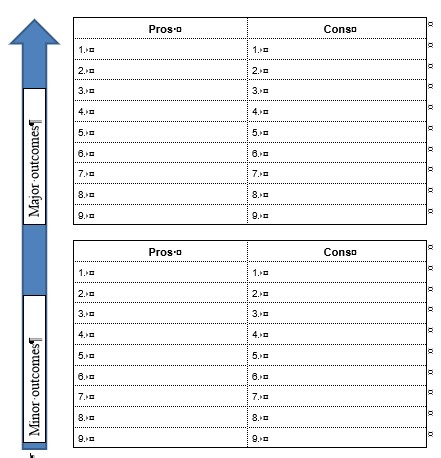In life, we need to make the right decisions for the big ones more frequently. We can achieve this by following some useful techniques I have outlined here.
Peter Drucker, yes, I have mentioned him before, observed that weak managers make plenty of easy decisions while strong managers make fewer decisions – only the big ones. The ability to make decisions and take calculated risks is a trait that is in one’s DNA. Risk-taking is not to be confused with serial entrepreneurs who dream up new ideas and then risk other people’s money. We are talking about well-considered decisions that are executed with commitment.
If you take a hit, is it above or below the waterline?
Jim Collins, of ‘Good to Great’ fame, specifies that when making a decision, you need to know will the decision, if it goes against you, affects you above or below the waterline? The ‘below the waterline’ risk will obviously sink the organization unless quick action is taken to mitigate the carnage.

Making unpopular decisions and hard calls when not all the information is at hand
Managers need to be able to make unpopular decisions and hard calls when not all the information is at hand. Jack Welch says that managers should rely on their gut instinct when information is not available. They should realize they have been appointed to the position because of their experience and their history of making more right decisions than wrong ones.
Being fearless and leading from the front is another of the givens for a leader. One of the messages from Peter Drucker was that outstanding performance is inconsistent with fear of failure.
Role-play all relevant ‘what-if’ scenarios to make decision-making easier when the situation occurs
Managers need to be constantly aware of the risks and discuss the likely consequences with their management team.
Lord Nelson is an excellent example of a leader who would discuss possible outcomes with his naval comrades. He would discuss tactics endlessly over evening meals with his team. His aim was that, during the heat of the battle, all the captains would know what to do, which would be the best course of action for the fleet. They would act as one, a “band of brothers.”
We can never make the right decision all the time. In fact, in some cases, making the wrong decision is better than being paralyzed with the options and not making any decision. If you realize it was wrong, you can abandon it and proceed on a different route.
Seek advice from your mentors and the leading management thinkers
Any decision that is going to affect your life should be thought through, and then your reasoning and tentative decision should be discussed with your mentors. See the section “Have a cluster of mentors behind you.”
When looking at a decision, it is useful to learn from successful decision-makers of the past. Jack Welch suggests that the decision maker needs to have the “curiosity that borders on skepticism,” making sure all the stones have been overturned.
Frame your decisions
For all major decisions and all those decisions you are having difficulties with, it is a sound idea to FRAME them.
Financial: ensure that you can afford any potential downside.
Research: look back on your own experiences or people you know who have made the same decision in the past, and learn from their experiences (history has a habit of repeating itself!).
Avoid looking back after the decision: move on and modify your course as and when needed, just as an ocean liner modifies its course during its journey. It is important to avoid being a “should-have” person.
Mentor: always discuss major decisions with your mentor. Only the foolish venture forward without having a mentor supporting them from behind the scenes.
Evaluate: study the pros and cons of the decision, separating out the issues that have major outcomes from those that are. You might find this template useful. Finally, assess whether any of the major issues are below the waterline.

Automate as many decisions as possible
I have a good friend in Germany who pointed out that decision-making is fatiguing so it makes sense to automate as many as possible. Christoph never has to think shall I run this morning or not as he made the decision years ago that he runs every morning, six days a week. Many work decisions can be made once, and then, by keeping to them, you are decluttering the mind.
Lack of sleep and decision-making make poor bedfellows
Arianna Huffington, at Huffington Post, is heading a sleep revolution. They have discovered compelling evidence that illustrates when deprived of sleep, we’re significantly more likely to make bad decisions and exercise poor judgment — which could easily end up costing more time and energy to correct.
Famous disasters such as Chernobyl, Three Mile Island, and The Exxon Valdez Oil Spill were a result of sleep deprivation. A 2015 Washington State University study showed when the study participants were deprived of sleep, their brains were unable to process feedback from their actions and changing circumstances.
For all major decisions, make sure you have evaluated the negative
The US president Franklin D Roosevelt notably warned against making major decisions where there was a complete consensus. He would make the team do more homework until the downsides had been discussed. The management guru Peter Drucker likewise saw conflicting views in positive terms, to be evaluated before a decision was made. Another business guru, Jack Welch, the former CEO of the conglomerate GE, would challenge any new idea, making sure it was well researched, before giving it the green light. Gary Hamel, one of the world’s most influential business thinkers, is adamant that organizations and leaders should embrace irregular people and their irregular ideas.
This is an extract from the toolkit (whitepaper + E-Templates) ,Winning Leadership: A Model on Leadership For The Millennial Manager by David Parmenter

Recent Comments